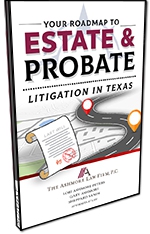In order to move forward with estate planning, knowing what you have is a must. This knowledge will help you and your estate planning attorney establish the best plan for your particular situation.
"Probate assets" would include all interest and assets, real or personal, tangible or intangible, that are owned outright by a person at the time of his or her death. "Probate assets" are those assets that have no beneficiary designation and will pass under the terms of the Will.
"Non-Probate assets" pass upon death to the named survivor or beneficiary "outside of probate." These assets are those that do not pass under the terms of a Will. They are assets that pass to a beneficiary named on the document that was signed when the asset was created. Think of your probate and non-probate assets as two different pots.
It is always easier to define the "non-probate pot," so let’s start there. The following is a list of assets that are part of the "non-probate pot." This list only gives a sampling of these types of assets; it is by no means all inclusive.
.jpg)
These types of assets are not controlled by the probate process or what a Will says. They are controlled by the document creating the asset. For example, the proceeds of a life insurance policy that properly lists a beneficiary goes directly to that beneficiary without having to go through the probate process. A checking account that is properly set up as "joint tenants with right of survivorship" or "payable on death" goes directly to the person named on the account. A Trust that was properly drafted and funded goes directly to the beneficiaries named in the Trust document.
Now, everything else you own is in your "probate pot." Your Will or the laws of intestacy (how property is distributed when there is no Will) control how all of those assets are distributed. These assets are referred to as the "probate estate."

To begin the Estate Planning process, it is imperative to know what assets you own. If you know what assets you have, you will be able to protect them in the event something were to happen to you.
For more information on assets and estate planning, request our free book.
Do You Need To Speak With An Experienced Estate Planning Lawyer In The Dallas Area?
If you need to speak to an experienced estate planning attorney please contact us online or call our Dallas office directly at 214.559.7202. We help clients throughout the Dallas area with all of their estate planning needs and look forward to helping you.


